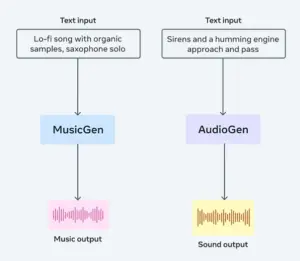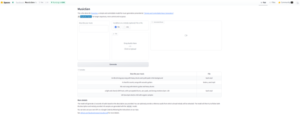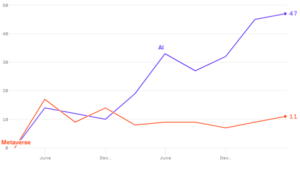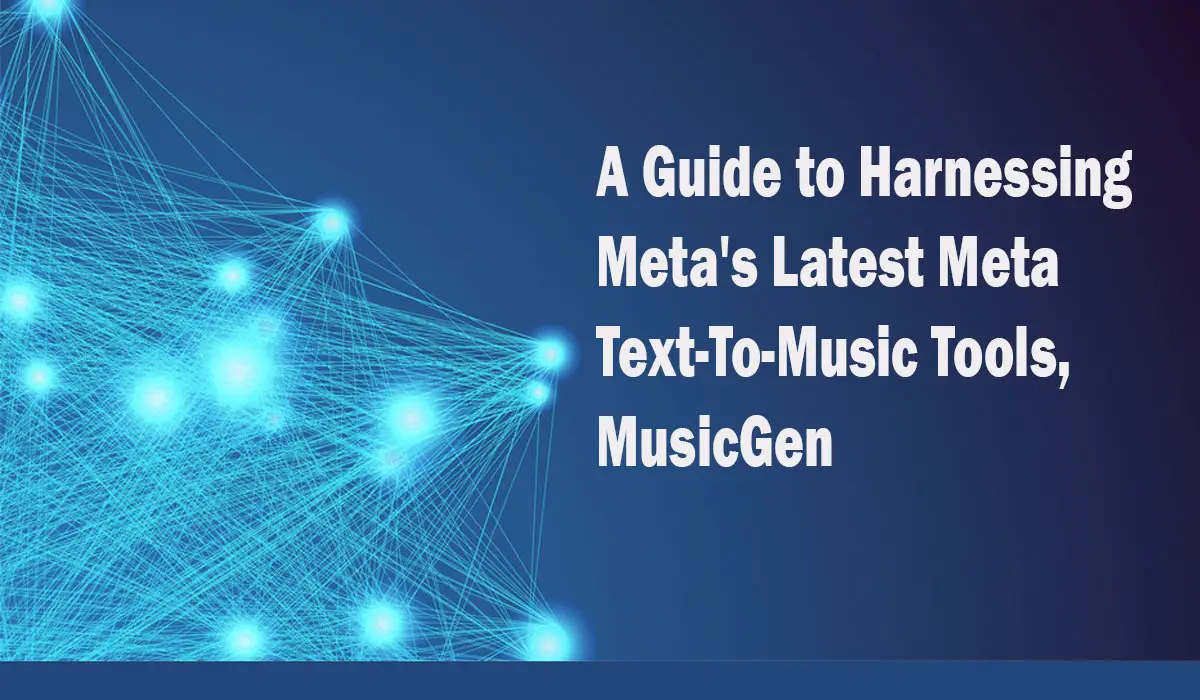Meta AI: A Rising Force in Generative Artificial Intelligence
Meta AI is rapidly emerging as a formidable contender in the realm of Generative Artificial Intelligence, poised to challenge industry giants like OpenAI and Google’s DeepMind. The company’s recent unveiling of the LLaMA Model, akin to OpenAI GPT’s AI Chatbot model, is testament to its commitment to innovation. Building on this momentum, Meta AI has introduced AudioCraft, a cutting-edge tool capable of translating text into music, effectively rivaling Google’s MusicLM.
A New Dawn for Generative AI
This marks a new era for the company, as it embarks on its journey into Generative AI for the masses. The potential of Generative AI to craft text-based, image-generated, or transcribed audio responses based on user cues is truly remarkable. This innovation holds immense promise for musicians and sound engineers, enabling artists to experiment freely with their creative concepts and offering users a head start on their projects.
Breaking Free from Copyright Constraints
A notable advantage of AudioCraft, also known as MusicGen, is its foundation on Meta-owned and licensed music. This ensures that artists need not grapple with copyright concerns, empowering them to use the generated music for commercial purposes. Moreover, Meta has made AudioCraft available on GitHub, underscoring its commitment to accessibility and collaboration. In this article, we delve into the functionality of Meta AI’s AudioCraft and provide insights into its practical application.
Exploring Meta AI’s AudioCraft: Unveiling the Potential
Meta AI’s AudioCraft is a groundbreaking text-to-music generative AI model, renowned for its ability to produce high-fidelity, lifelike musical compositions. At its core, AudioCraft harnesses the power of several AI models, including MusicGen, AudioGen, and EnCodec. MusicGen and AudioGen utilize the Single Autoregressive Language Model (LM) to transform text into music, while EnCodec introduces specific audio effects. Notably, MusicGen is meticulously trained using Meta’s proprietary collection of licensed music.
The Evolution of AudioCraft: Elevating Musical Creativity
The latest addition to Meta AI’s lineup, AudioCraft, is an advanced AudioGen model trained on raw audio signals. This innovation is equipped to generate a diverse array of environmental sounds and effects, such as creaking floors and barking dogs. All three models—MusicGen, AudioGen, and EnCodec—are made available as open-source resources, empowering researchers and practitioners to leverage and expand upon them. This collaborative approach contributes to the advancement of AI-generated audio and music.
A Symphony of Possibilities: AudioCraft in Action
Meta AI’s vision extends beyond music generation; the company aims to provide standard instruments like synthesizers. Interested individuals can explore samples of AudioGen-generated and MusicGen music, gaining insight into the capabilities of this innovative technology. Similar to other generative AI systems, AudioGen draws from a repository of public sound effects to produce diverse auditory experiences. Meanwhile, the EnCodec decoder excels in generating high-quality music with minimal artifacts.
🎵 Today we’re sharing details about AudioCraft, a family of generative AI models that lets you easily generate high-quality audio and music from text.https://t.co/04XAq4rlap pic.twitter.com/JreMIBGbTF
— Meta Newsroom (@MetaNewsroom) August 2, 2023
Harnessing the Power of Music Gen: A Step-by-Step Guide
Using Meta AI’s MusicGen is a seamless process, particularly for those seeking to explore its potential through a web interface. To begin, users can access MusicGen via Hugging Face, a popular platform for AI-related projects. The user-friendly interface features three panels, the first of which houses a textbox for inputting prompts. Additionally, users have the option to upload audio files, utilize a microphone for transcription, or engage with other input methods.
Once a prompt is entered, users can simply click “Generate,” prompting MusicGen to swiftly create the desired audio composition. The generated audio is presented in the upper-right box under the label “Generated Music.” For those seeking customization, the option to duplicate the code and make adjustments is readily available. To further acquaint yourself with MusicGen’s capabilities, consider exploring sample audio produced by AudioGen and MusicGen.

The Road Ahead: Meta AI’s Continued Innovation
Beyond MusicGen, Meta AI is actively pursuing a variety of transformative projects. The company is diligently working on an AI-powered chatbot akin to OpenAI’s ChatGPT and Google Bard. While an official release timeline has yet to be disclosed, industry insiders anticipate its debut in the imminent future. Moreover, Meta AI is expected to contribute further to the landscape of generative AI, with companies like Apple, Samsung, and X also making significant strides in this domain.
Introducing Metas AI’s Personas: Shaping the Future of Social Media
Meta AI is poised to introduce a new product group dedicated to the advancement of generative AI. Following in the footsteps of competitors like TikTok and Snapchat, which have already integrated AGI into their platforms, Meta is focusing on the next generation of social media enhancements. A notable development on the horizon is the impending release of Metas AI’s Personas, anticipated to seamlessly integrate with products such as Instagram, Facebook, Messenger, and WhatsApp.
Bridging the Gap: Human-Like Responses and User Retention
As part of its ongoing efforts, Meta AI has unveiled personas capable of generating human-like responses. During testing, these personas exhibited a distinct style reminiscent of historical figures such as Abraham Lincoln. Retaining user engagement and satisfaction is a pivotal challenge, and Meta AI has risen to the occasion with safeguards that excel in comparison to OpenAI’s GPT. This meticulous attention to detail ensures that the forthcoming release will feature refined prompts and implementation.

Pioneering the Future: Meta AI’s Expansive Vision
Meta AI’s aspirations extend beyond individual tools; the company aims to empower apps and services through its innovations. Collaboration is already underway, exemplified by the collaboration between Meta CEO Mark Zuckerberg and Microsoft’s CEO in the publication of LLaMa 2. This collaboration echoes OpenAI’s successful revenue model, which involves providing APIs for developers to seamlessly integrate AI capabilities into their own applications and services.
Meta AI CEO Mark Zuckerberg has articulated the company’s commitment to deploying AI-powered tools, emphasizing the significance of AI-driven advertising products and user retention. Notably, Meta AI has achieved consistent revenue growth of at least 15% over two consecutive quarters, a testament to its unwavering dedication to innovation and excellence.

In conclusion, Meta AI’s foray into Generative AI with AudioCraft and MusicGen marks a significant milestone in the world of technology-driven creativity. As the company continues to expand its portfolio of offerings, it remains at the forefront of the evolving landscape of AI and its transformative potential across various industries.

